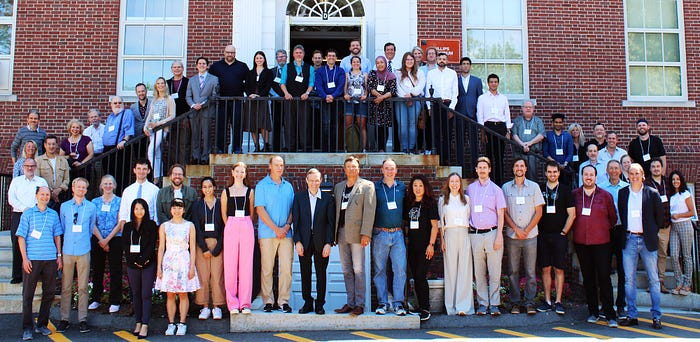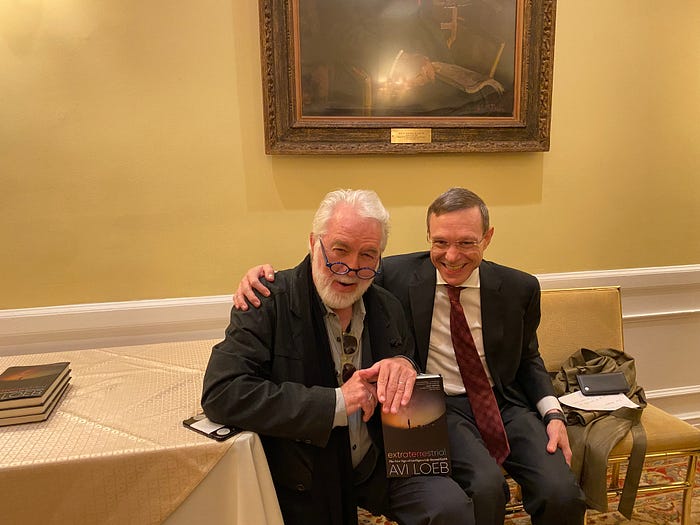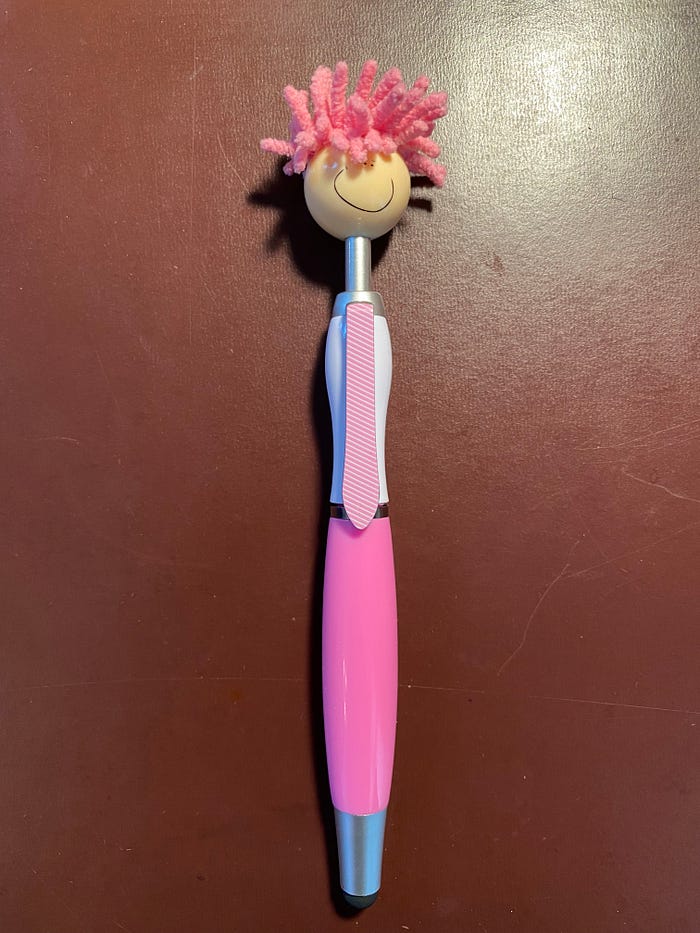
As chair of the Harvard Astronomy department between 2011–2020, I was engaged in many fundraising activities. They often involved exhausting dinners, banquet speeches and multi-day trips to the hometowns of wealthy individuals. These efforts were by and large unsuccessful, since the prospective donors had similar requests to support other mainstream telescopes for astronomy projects.
Half a year after completing my departmental service, I published the bestselling book Extraterrestrial in January 2021, concerning the anomalies of the first reported interstellar object, `Oumuamua. Within a few months, a flood of influential people and multi-billionaires showed up at the porch of my home and offered financial support to my research account at Harvard University. The first among them did not contact me. I received an email from the administrator of the Harvard Astronomy department stating that I have a new research account. When I inquired: “What do you mean? How did this happen? Can you tell me who the donor is?”, she replied: “I do not know.” To that I said: “It is my privilege as Harvard faculty to know who gave me the money. Would you mind asking the Harvard Development Office for the contact information of the donor?” A few days later, she came back to me with the name, Eugene Jhong. The following day, the remarkable Eugene arranged a Zoom call with me, after which he decided to donate another million dollars towards my research program. This and other donations from like-minded visionary donors: Vinny Jain, Joerg Laukien and Bill Linton, established the financial foundation for the Galileo Project, which I co-founded together with the passionate scientist and biotech entrepreneur, Frank Laukien, in July 2021. Over the past year, the generous and fantastic team member, Adnan Sen, has been adding essential financial support towards the routine operations of the project. Altogether, no fundraising effort was initiated so far. The only banquet dinner took place during the first year’s celebration of the Galileo Project in August 2022.
By now, the Galileo Project benefits from three 3-year postdoctoral fellowships, generously donated by Frank Laukien, Eric Keto and the Brinson Foundation. Last year I received a call out of the blue from the Brinson Foundation’s representative, who explained that their board wants me to mentor young scientists and inspire them to innovate. By now we appointed exceptionally talented individuals from prestigious backgrounds to the first three fellowships. They are: Richard Cloete from the University of Cambridge in the UK, Laura Domine from Stanford University and Juliana Cherston from MIT. In addition, the wonderful entrepreneur Teddy Jones funded a summer internship for undergraduate students engaged with the Galileo Project, which will support Amir Siraj this summer.
A few months after announcing the intent to retrieve fragments of the first interstellar meteor, IM1, from the Pacific Ocean in order to check whether its anomalous material strength was artificial in origin, the brilliant entrepreneur Charles Hoskinson had a Zoom call with me in which he committed 1.5 million dollars to cover the related expenses.
Last week I gave a lecture about the Galileo Project to two dozen individuals at the Harvard Club in New York City. One of them, Jim Hart, who wrote the script for the movie “Contact” with Carl Sagan, approached me to say that in his eyes my research represents the present-day continuation of Carl Sagan’s vision. At the same time, I received an email from a Galileo Project fan who coached me: “When you give your time to audiences, please let supporters know how they can contribute to the project.” I replied that we have a “Support Us” portal on the Galileo Project website. This is particularly important as we expand our operations to create multiple new copies of our first working observatory for Unidentified Aerial Phenomena (UAP) at Harvard University.

During my lecture, the amazing Valerie Kate Jensen stood up from the audience and said: “I will be glad to fully fund a copy of your observatory. For a long-while I wanted to document birds in our sky, and the Galileo Project cameras would be ideal for that as well as UAP.” Right there she donated a fraction of a million dollars to the Galileo Project. I immediately promised: “We will give you a full album of all the birds we see,” to which she replied: ”Sparkle on, Dr. Loeb!” For starters, she gifted me a pink pen that she artistically made and offered to be a prospector for the upcoming Pacific Ocean expedition. “Good luck in reaching the stars!,” she wished us, to which I replied: “and you are one of them.”

How did all of this happen and why is it in such contrast to my pre-`Oumuamua experience? Donors want to be inspired by a vision that they resonate with. Many of them wish to support disruptive innovation that could change the world we live in, rather than incremental improvements in our scientific knowledge. They leave the latter to grant allocation committees of federal funding agencies, which are dominated by mainstream scientists who usually do not take risks “in order not to waste tax-payers money.”
The lesson from my experience over the past two years is that disruptive innovation in science stimulates spontaneous generosity. I promised all my donors that I will do my best and work day and night, short of my morning jog at sunrise, to fulfil their trust.
What makes me subdued on occasion, is getting personally attacked by some practitioners of science in academia who are not willing to follow the scientific method in resolving anomalies. My reasoning is simple: if the US Congress establishes the All Domain Anomaly Resolution Office and its director Sean Kirkpatrick visits my home and even co-authors a scientific paper with me, it is my civil duty as a scientist to follow the interests of government and the general public in studying anomalous objects near Earth for the possibility that some of them are of extraterrestrial technological origin. That this is common sense for me and not others, is fair play. But that some of my colleagues, including experimentalists and observers who are themselves seeking hypothetical entities — such as specific dark matter particles or Planet Nine, find it legitimate to ridicule this research endeavor is puzzling to me. After all, my line of research was triggered by anomalous data and my funding stems from the private sector and does not take away funds from the search for the nature of dark matter or Planet Nine. What is the real source of this academic hostility?
I use this research topic as an opportunity to educate not only the public but also my colleagues in academia about how science should be done. If we encounter anomalous data, we should resolve the puzzle by getting better data, not by ridiculing those who attempt to get the data. Otherwise, why would we search for the axion or the lightest supersymmetric particle as dark matter? Or to bring things closer to home: why should those who ridicule the search for anomalous extraterrestrial objects promote the search for Planet Nine - which was not found as of yet, despite the huge effort they invested in the search?
Yesterday, one of the public supporters of my research emailed me a quote from the philosopher Arthur Schopenhauer: “All truth passes through three stages. First, it is ridiculed. Second, it is violently opposed. Third, it is accepted as being self-evident.”
Today, a Politico reporter who interviewed me, Lara Seligman, had the brilliant insight: “What you encounter in academia is raw jealousy.”
Here’s hoping for a brighter future, where generosity and vision prevail not only in the public and government sectors, but also in academia.
ABOUT THE AUTHOR

Avi Loeb is the head of the Galileo Project, founding director of Harvard University’s — Black Hole Initiative, director of the Institute for Theory and Computation at the Harvard-Smithsonian Center for Astrophysics, and the former chair of the astronomy department at Harvard University (2011–2020). He chairs the advisory board for the Breakthrough Starshot project, and is a former member of the President’s Council of Advisors on Science and Technology and a former chair of the Board on Physics and Astronomy of the National Academies. He is the bestselling author of “Extraterrestrial: The First Sign of Intelligent Life Beyond Earth” and a co-author of the textbook “Life in the Cosmos”, both published in 2021. His new book, titled “Interstellar”, is scheduled for publication in August 2023.
